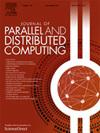GreediRIS: Scalable influence maximization using distributed streaming maximum cover
IF 3.4
3区 计算机科学
Q1 COMPUTER SCIENCE, THEORY & METHODS
引用次数: 0
Abstract
Influence maximization—the problem of identifying a subset of k influential seeds (vertices) in a network—is a classical problem in network science with numerous applications. The problem is NP-hard, but there exist efficient polynomial time approximations. However, scaling these algorithms still remain a daunting task due to the complexities associated with steps involving stochastic sampling and large-scale aggregations. In this paper, we present a new parallel distributed approximation algorithm for influence maximization with provable approximation guarantees. Our approach, which we call GreediRIS, leverages the RandGreedi framework—a state-of-the-art approach for distributed submodular optimization—for solving a step that computes a maximum k cover. GreediRIS combines distributed and streaming models of computations, along with pruning techniques, to effectively address the communication bottlenecks of the algorithm. Experimental results on up to 512 nodes (32K cores) of the NERSC Perlmutter supercomputer show that GreediRIS can achieve good strong scaling performance, preserve quality, and significantly outperform the other state-of-the-art distributed implementations. For instance, on 512 nodes, the most performant variant of GreediRIS achieves geometric mean speedups of 28.99× and 36.35× for two different diffusion models, over a state-of-the-art parallel implementation. We also present a communication-optimized version of GreediRIS that further improves the speedups by two orders of magnitude.
greendiris:可扩展的影响最大化使用分布式流最大覆盖
影响最大化-识别网络中k个有影响的种子(顶点)子集的问题-是网络科学中具有许多应用的经典问题。这个问题是np困难的,但是存在有效的多项式时间近似。然而,由于涉及随机抽样和大规模聚合的步骤的复杂性,扩展这些算法仍然是一项艰巨的任务。本文提出了一种新的具有可证明近似保证的影响最大化并行分布近似算法。我们称之为GreediRIS的方法利用了RandGreedi框架——一种用于分布式子模块优化的最先进方法——来解决计算最大k覆盖的步骤。greedris结合了分布式和流计算模型,以及修剪技术,有效地解决了算法的通信瓶颈。在NERSC Perlmutter超级计算机上多达512个节点(32K核)的实验结果表明,GreediRIS可以获得良好的强大扩展性能,保持质量,并且明显优于其他最先进的分布式实现。例如,在512个节点上,在最先进的并行实现中,对于两种不同的扩散模型,最高性能的GreediRIS变体实现了28.99倍和36.35倍的几何平均加速。我们还提出了一个通信优化版本的GreediRIS,进一步提高了两个数量级的速度。
本文章由计算机程序翻译,如有差异,请以英文原文为准。
求助全文
约1分钟内获得全文
求助全文
来源期刊

Journal of Parallel and Distributed Computing
工程技术-计算机:理论方法
CiteScore
10.30
自引率
2.60%
发文量
172
审稿时长
12 months
期刊介绍:
This international journal is directed to researchers, engineers, educators, managers, programmers, and users of computers who have particular interests in parallel processing and/or distributed computing.
The Journal of Parallel and Distributed Computing publishes original research papers and timely review articles on the theory, design, evaluation, and use of parallel and/or distributed computing systems. The journal also features special issues on these topics; again covering the full range from the design to the use of our targeted systems.
 求助内容:
求助内容: 应助结果提醒方式:
应助结果提醒方式:


